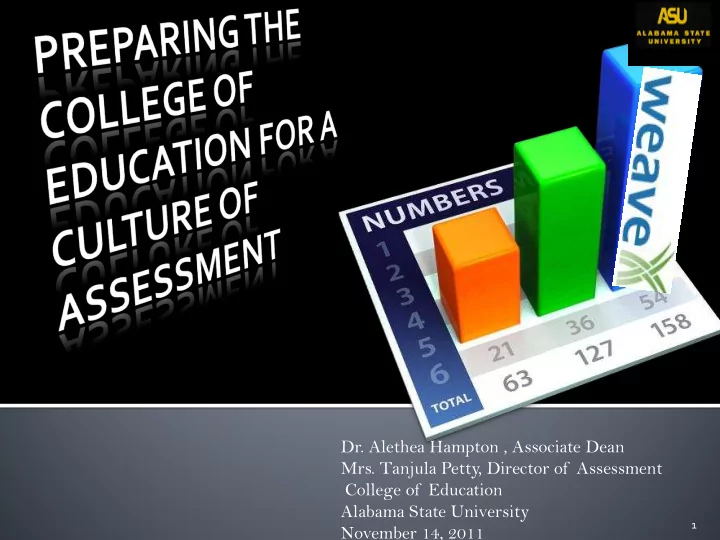

Dr. Alethea Hampton , Associate Dean Mrs. Tanjula Petty, Director of Assessment College of Education Alabama State University 1 November 14, 2011
A S S E S S M E N T
The systematic gathering and analyzing of information to inform and improve student learning or programs of student learning in light of goal-oriented expectations (Walvoord & Johnson-Anderson, 1998). At the heart of education About accountability Help institutions make informed decisions Curriculum Pedagogy Staffing Programming Lead to wiser planning A POWERFUL INSTRUMENT OF IMPROVEMENT Walvoord, B., & Johnson-Anderson, V. (1998). Effective grading: A tool for learning and assessment.
A form of assessment in which students are asked to perform real-world tasks that demonstrate meaningful application of essential knowledge and skills. Student performance on a task is typically scored on a rubric to determine how successfully the student has met specific standards . (Mueller)
To Improve To Inform To Prove
1. Pre-instruction 2. During Instruction 3. Post-instruction
Your program objectives should always identify: WHO is involved? WHAT are the desired outcomes? WHEN will the outcomes occur? HOW will the progress be measured?
Goals must be realistic – you can’t instill all of the knowledge for the program in one semester. A goal is a general statement about the aims or purposes of education in your program. They are broad. Must prioritize – rank in order of importance, you can’t accomplish it all at once.
A S S E S S M E N T
Group C & I Group ISP Early Childhood Education Instructional Leadership Elementary Education Counseling (General & School) Secondary Education Library Education Media Reading Specialist Collaborative Education Group Field & Clinical Group HPER Health Group TEC Physical Education Recreation Group PSY Psychology
Write three (3) educational goals that are representative of your unit. Now look at your list and ask yourself the following questions: Is it realistic? Is it flexible? Does it fit in with Vision 20/20 goals?
Learner outcome statements should Specify the level, criterion, or standard for the knowledge, skill, ability, or disposition that the student must demonstrate Include conditions under which they should be able to demonstrate their knowledge, skills, abilities or dispositions Contain active verbs Be measurable Be stated so that the outcome can be measured by more than one assessment method
Write three (3) learner outcomes and associate them with the goals that you have created. Now look at your list and ask yourself the following questions: Are they aligned with program goals? Are they measurable? Can they be measured by more than one assessment method? Are they framed in terms of the program and not individual courses or students? Are they simple — is there only one element in each objective statement? Do they describe intended learning outcomes and not actual outcomes?
Recommend
More recommend